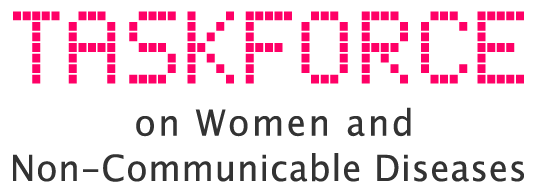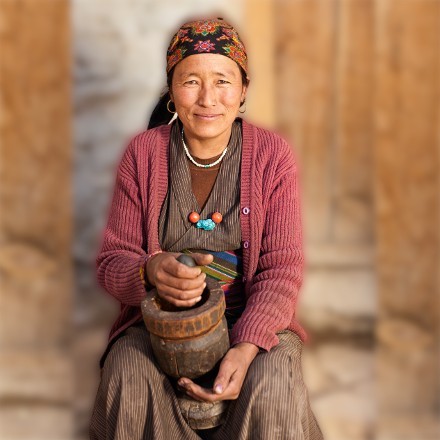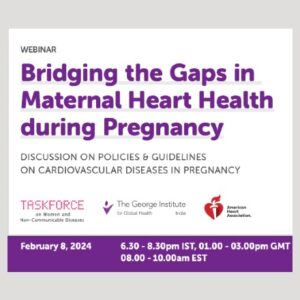At Women Deliver 2023, The George Institute for Global Health and World Health Organization launched a global call-to-action to share evidence, best practice and learning around the gendered barriers to access for non-communicable disease (NCD) prevention, early diagnosis, treatment, and care.
In Korea, single mother Mrs. Kim works as a farm labourer and has a treatable heart condition. Her main goal is to ensure her son’s education and future success, but the financial burden of paying for his school tuition every Spring adds stress to her life. This stress often causes her to forget to take her necessary medication, negatively impacting her health. Mrs. Kim believes that poverty is the underlying cause of her health condition, preventing her from accessing the essential treatment she needs.
Unfortunately, Mrs. Kim’s story is not unique, as many women and girls around the world face similar challenges in preventing, diagnosing, treating, and caring for NCDs. NCDs, including cancer, diabetes, cardiovascular diseases, chronic respiratory diseases, and mental health conditions are the cause of ⅔ of deaths in women. Access to prevention and care is particularly challenging in low-resource settings, where women’s health often takes a back seat within families due to financial constraints and caregiving responsibilities, while travel challenges can further hinder access to essential healthcare.
In response to these gender disparities in NCDs a global call-to-action for evidence, best practice and learning was launched at Women Deliver 2023, in Kigali, Rwanda. Grassroots innovators, youth leaders, researchers, and high-level stakeholders gathered to raise awareness of the gendered impacts of NCDs, and to discuss solutions that can empower women, reduce discrimination, and realise global commitments to reduce deaths from NCDs. At the Commission on the Status of Women (CSW) in March, Liberia’s First Lady Her Excellency Madam Clar -Weah had called for a concrete action plan incorporating digital health programs, research, innovation, and data-driven solutions, with a focus on grassroots innovations that address specific needs of women and girls and promote sustainability. This call-to-action reiterated this task.
Action to close the gender-health gap.
During a side-event at Women Deliver, Dr Adelheid Onyango highlighted the importance of integrating NCD services within maternal and child health care. NCDs and maternal and child health issues often share common risk factors, such as poor nutrition, lack of physical activity, and exposure to tobacco and alcohol. By integrating services, a comprehensive life-course approach can be adopted to address these risk factors, leading to better health outcomes and improved efficiency through reduced duplication of services and enhanced coordination.
The World Health Organization is actively strengthening the capacity of healthcare workers to deliver integrated outpatient care in Africa, by simultaneously screening, diagnosing, and managing both NCDs and maternal child health issues. This training is provided through hospitals, Continuing Medical Education (CME) workshops, and supervision, enabling effective NCD screening and management during antenatal and postnatal care visits. Additionally, community outreach and education play a vital role in raising awareness about NCDs and promoting preventative measures.
Collecting and analysing data by sex and gender can also result in more targeted and effective interventions to prevent and address NCDs. Dr Devaki Nambiar emphasised that men and women may display different disease symptoms, posing challenges in identifying and diagnosing certain conditions in women. For instance, women experiencing a stroke might display more generalised symptoms like confusion and weakness, which necessitates greater awareness among families, healthcare systems, and support structures. Recognising these gender distinctions can improve various aspects of health programming, ensuring they are better tailored to the specific needs of diverse populations. To achieve this, research should actively involve gathering perspectives from women and girls.
Young leaders and grassroots innovators are leading the way
Dr. Susan Onyango, a nutritionist working with women living with HIV in Homa Bay County, Western Kenya leads the Healthy Women Project. Through this initiative, she addresses the growing burden of obesity by combining health education and practical training in agriculture and nutrition. The project’s goal is to empower women to reclaim decision-making power related to land, traditionally held by men, and make healthy food choices for themselves, their families, and households. Recognising the importance of gender equity in addressing NCDs, this grassroots initiative was a winning submission to the NCD Lab, an initiative by the WHO Global Coordination Mechanism on NCDs.
Promoting the active participation of women and girls in health-related decisions is crucial, as emphasised by young leader Louise Johansson. Including them in policymaking ensures that their unique needs, challenges, and priorities are addressed. The involvement of young people brings fresh perspectives, energy, and innovative ideas to the forefront, granting them a sense of ownership and agency over decisions affecting their lives and promoting autonomy and rights. Louise Johansson’s creative contribution to the NCD Child Young Leaders Program involved developing an educational trivia game called ‘BUMM – body, uterus, mind, and mixed,’ aiming to raise awareness of menstrual disorders and their connection to NCDs.
Although grassroots innovations may initially show positive results, maintaining their impact requires continuous support and resources – a responsibility that we can all share to ensure their sustainability.
An opportunity for all
As we move forward, the upcoming United Nations High-Level Meeting on Universal Health Coverage (UHC) in September provides a chance to underscore gender-responsive solutions in building resilient and equitable health systems. To join the global call-to-action and contribute to gender equity in NCD responses, individuals and organisations can commit to priority actions and share their efforts through the ‘Women and NCDs‘ Community of Practice on the WHO Knowledge Action Portal.
About the authors:
Claudia Selin Batz
Claudia is an emerging public health professional with 5 years of experience in communications, advocacy, and policy. She is the Policy and Advocacy Advisor at The George Institute for Global Health, working on a programme of policy, stakeholder engagement and thought leadership to increase the impact of TGI’s research. She works with the World Health Organization, UN and other global health organisations and networks, conducting advocacy activities focused on the UK, where TGI works in collaboration with Imperial College London. Claudia is a member of the ‘Taskforce on Women and Non-Communicable Diseases (NCD)’ and actively collaborates with the partner organizations in advocacy efforts in women’s health.
Mame-Yaa K. Bosomtwi
Ms. Mame-Yaa K. Bosomtwi is the Stakeholder Management Office and Gender Equity and Human Rights focal person in the Noncommunicable diseases department at WHO Headquarters in Geneva. Her background and training is in public health, political science and international development.




